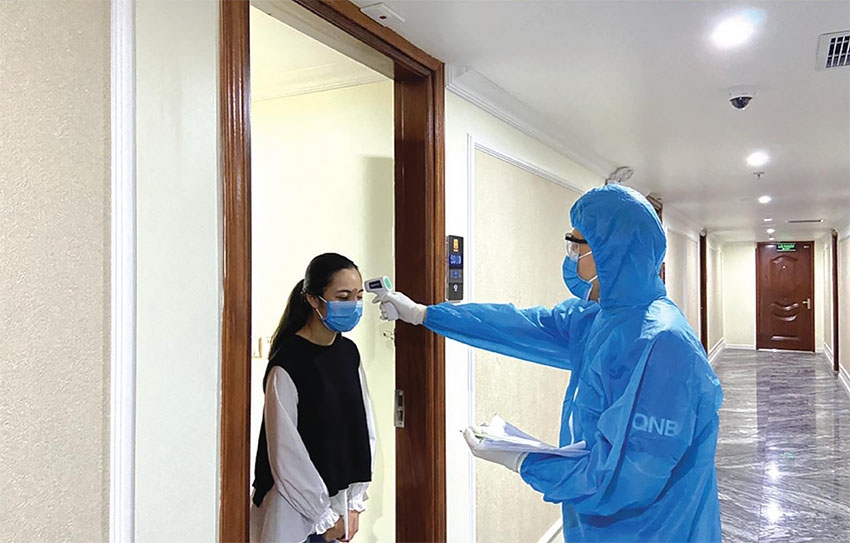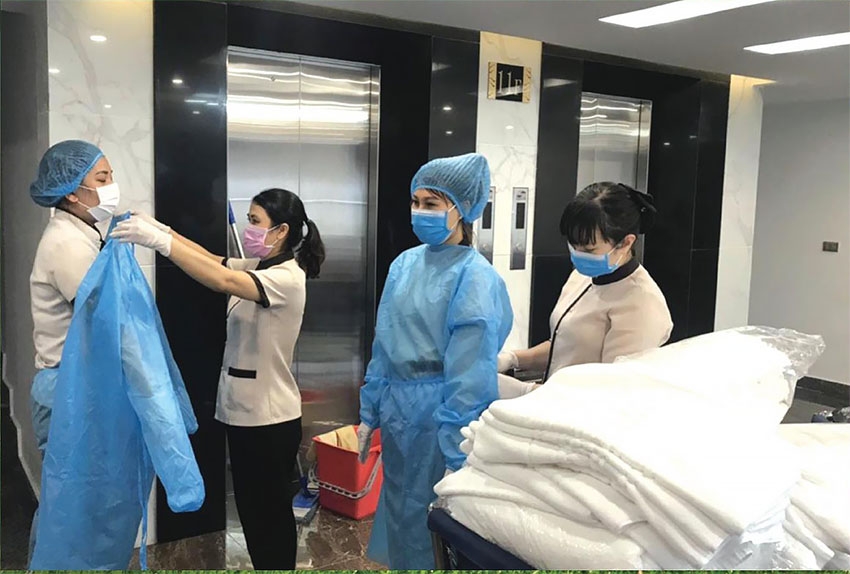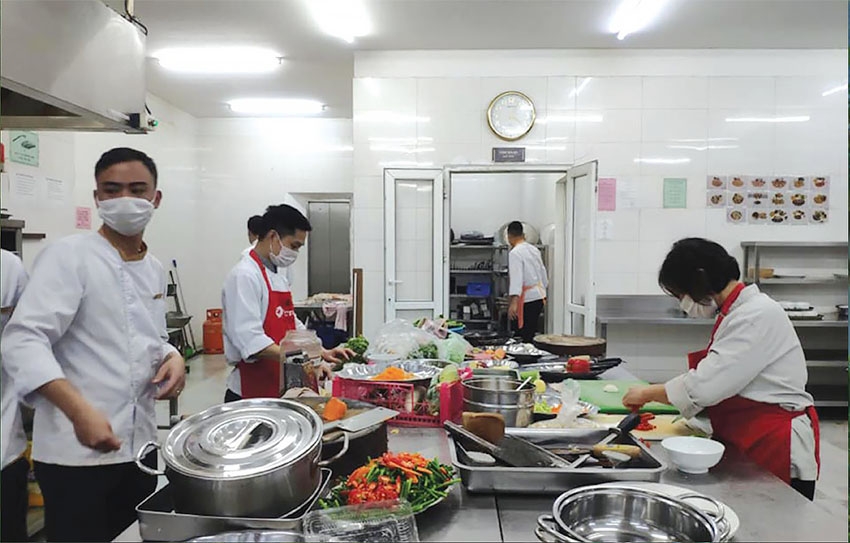Vietnam tourism ambassadors
 |
| Vietnam tourism ambassadors |
FOR THE GREATER GOOD
Although it only opened for the first time in January, Bao Minh Radiant Hotel in Halong is already famous. Over the past month, tourists from South Korea, China, Japan, the UK, and India were forced into quarantine in accordance with government regulations when their flight landed at Van Don International Airport.
The hotel has welcomed a total of 157 guests, including 127 from South Korea. All of the guests have since completed 14 days of isolation, with the last guest leaving on March 21, before the hotel was disinfected and embarked upon a pause of business activities to wait for tourism to be rehabilitated.
Speaking to Timeout, Bui Thuy Hanh, director of the 4-star Bao Minh Radiant Hotel, said that the establishment received four Chinese guests quarantined in early February at the request of local authorities. After the four guests checked out, the hotel was again asked to prepare for welcoming guests from South Korea.
“There is a strong outbreak in South Korea and we agreed with the government’s viewpoint that fighting the epidemic is like fighting against an enemy. We also decided to make all meals and accommodation free for tourists to share the burden with Quang Ninh province.”
According to Hanh, the hotel used 98 of the total 135 rooms as accommodation for the guests over the 14 days. Two guests shared a room, each usually costing VND1.2-1.4 million ($50-58) per night. All food and necessities were provided free of charge to the room for visitors with standard meals worth about VND180,000 ($7.5) per day. Two medical staff also visited each room to measure body temperatures and check guests’ health twice a day.
Hanh said that in order to make the decision, she had arguments with both herself and the staff. “Welcoming guests from the epidemic area and telling staff not to worry is not easy. What happens if one of those guests is infected? But if everyone refused, where could they go? And would the community be safe? After explaining that to the staff, they were happy to agree,” Hanh said.
Nearly 50 employees volunteered to stay and assist guests. They worked hard, complied with the Ministry of Health’s safety regulations, and accepted that they would have to be separated from their families for 14 days.
At another accommodation facility in Vinh Long province, Ut Trinh homestay – a place chosen by many Europeans when visiting the Mekong Delta – also announced the welcome of guides and people working in tourism on voluntary isolation. After all foreign guests staying at the homestay left on March 19, Ut Trinh homestay conducted disinfection of the entire area to prepare to welcome the guides, who had finished their customer service schedules but wanted to isolate themselves to ensure safety for the relatives and for the community.
 |
 |
HOUSE OF COMFORTS
According to Pham Thi Ngoc Trinh, deputy director of Mekong Travel and owner of Ut Trinh homestay, some tour guides who finished the tour before March 17 were staying at the homestay, and many still registered but cancelled when the government called for people to restrict movement. The homestay also reported that Vinh Long Department of Tourism and the local commune health station only accepted those who were not required to be quarantined but wanted to be isolated voluntarily in good health.
Every day, the homestay conducted body temperature measurements for the tour guide twice and recorded it in the health declaration using the form provided by the department of health. If guests show any signs of abnormal health, they are immediately notified by the commune health station for timely treatment.
The cost for the homestay to support each guest amounts to about VND300,000 ($12.5) per day, including living expenses and three meals. Along with providing a safe place to stay, the homestay also organises activities to improve one’s health such as cycling, gardening, baking, planting vegetables, and even fishing, just like on a normal vacation, of course with their masks.
“We did it because of our emotional attachment to the guides. We felt sorry for them when they lamented having to lock themselves in boring walls in the city, so this idea came up. As we are in the same industry, we should trust each other, but if they are domestic tourists, the facilities are not qualified to receive medical treatment nor dare to accept them because of the high risk of infection,” Trinh shared.
Pham Thi Hang, director of Hanoi Emerald Waters Hotel, also called on the hotel’s staff to join the prevention of the COVID-19 epidemic with the city by volunteering as a quarantine place. Three hotels of this brand are now ready to welcome visitors for free isolation, serving meals with 3-star standards.
After only a short time, some 160 hotels and resorts in 24 cities and provinces throughout Vietnam have registered to serve tourists in isolation for free or at a discount of 30-50%, including many hotels and all resorts with 4-5 star standards such as Hoi An Beach Resort, Hoa Co Villas, and Mangove Can Gio Hotel.
In addition to these typical accommodation facilities, many other hotels and resorts have voluntarily served foreign guests to quarantine when called upon by local authorities.
By doing so, they have contributed to beautifying the image of the country and people of Vietnam in the eyes of international visitors, going some way to ensuring Vietnam remains a reputable destination for travellers in the years to come.
What the stars mean:
★ Poor ★ ★ Promising ★★★ Good ★★★★ Very good ★★★★★ Exceptional
Themes: Home Sweet Home
Related Contents
Latest News
More News
- Tides of Heritage: A Tet speciality at InterContinental Phu Quoc Long Beach (January 20, 2026 | 12:08)
- Muong Thanh launches Lunar New Year gifts inspired by tradition (January 16, 2026 | 16:41)
- The Grand Ho Tram seeks responsible entertainment with pilot casino access (January 16, 2026 | 10:56)
- Ocean Resort by Fusion Quy Nhon launches Lunar New Year 2026 package (January 15, 2026 | 11:11)
- Regent Phu Quoc announces general manager appointment (January 15, 2026 | 11:06)
- Fusion to debut two landmark hotels in early 2026 (December 26, 2025 | 11:46)
- Pan Pacific Hanoi unveils festive season of light and music (December 15, 2025 | 18:22)
- JW Marriott Hotel & Suites Saigon unveils festive initiatives (December 12, 2025 | 15:12)
- Festive magic by nature unfolds at JW Marriott Cam Ranh Bay Resort & Spa (December 11, 2025 | 18:17)
- The Reverie Saigon presents festive programme (December 11, 2025 | 18:15)

 Tag:
Tag:




















 Mobile Version
Mobile Version